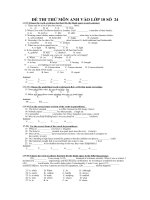- Trang chủ >>
- Đề thi >>
- Tuyển sinh lớp 10
ĐỀ THI THỬ MÔN ANH VÀO 10 SỐ 18
Bạn đang xem bản rút gọn của tài liệu. Xem và tải ngay bản đầy đủ của tài liệu tại đây (75.99 KB, 4 trang )
ĐỀ THI THỬ MÔN ANH VÀO 10 SỐ 18
I. Choose the word whose underlined part is pronounced differently
from the others.
1. A. watched B. finished C. lived
D.worked
2. A. their B. month C. those
D. they
3. A. got B. job C. hot D.
show
4. A. takes B. dances C. hopes D.
looks
II. Choose the best answer from the four options given to complete
each sentence.
1. My son has learnt English………………….he was 7 years old.
A. for B. since C. in D.
on
2. It is…………………………… easy test that students could do.
A. such an B. enough C. so D.
too
3. These houses 50 years ago.
A. are built B.built C. were built
D. build
4. Hurry up or you'll be late …………………… school.
A. on B. in C. to D. for
5. She ……………………….a letter when the telephone rang.
A. wrote B. was writing C. was written D.
has written
6. People in Israel are going to celebrate their festival ……………. is
called Passover.
A. whose B. who C. which D.
where
7. Don't talk in class, …………………….?
A. do you B. don't you C. will you D.
did you
8. She asked me if I………………………a laptop computer the
following day.
A. buy B. will buy C. bought D.
would buy
III. Givwe the correct form of the words in brackets.
1. This coffee is too to drink. (HEAT)
2. It is …………………… to eat too much sugar and fatty food.
(HEALTH)
3. I spent my in the country. (CHILD)
4. He was punished for his …………………………. (LAZY).
5. They walked and talk ……… on the way home. (HAPPY)
IV. Give the correct form of the verbs in brakets.
1. They (study)…………………….… ………. English for 10
years.
2. Would you mind (tell)………… …….…………me where I can go to
post the letter ?
3. Ba wishes he (be) ……… ……………………. a good doctor in the
future.
4. The water was too hot for me……………………………… (drink).
5. His father (be) ……………… to America many times.
6. They (get) ………… ………. married next Sunday.
V. Complete the second sentence so that it has a similar meaning to
the first one.
1. The exercise was so difficult that I could not do it.
It was
2. “Are you cooking now?” she asked me.
She asked
3. We can solve this problem.
This
problem
4. They started playing tennis in 2003.
They have
5. I last saw him two weeks ago.
I haven’t
………………………………………………………………
VI. Make sentences from the words and phrases provided.
1. I / not / meet / my parents / since last Sunday.
2. He / say / he / be / back / following / day.
3. It / difficult / learn English / without / good dictionary.
………………………………………………………………………………………………………………
4. This/ be / best / movie / I / ever / see.
…………………………………………………………………………………………………………………
VII. Read the passage and answer the following questions. (2pts)
Alexander Fleming was born in 1881 inScotland. He went to a
small school in a village, and when he left school he didn’t go to
university. He worked for five years in an office. But his brother, Tom,
was a doctor and helped Fleming to go to university and study medicine.
So he went toLondonUniversityand in 1906 he became a doctor. In 1915,
Fleming married Sarah McElroy, an Irish woman. They had one son.
During the First World War, many soldiers died in hospital because they
didn’t have the right medicines. So after the war, Fleming tried to find a
drug that could help them. He worked for many years and in 1928 he
discovered a new drug and he called it “penicillin”. He later worked with
an Australian and a German scientist to develop a drug that doctors could
use. In 1945, they won the Nobel Prize in medicine for their work on
penicillin.
1. Was Alexander Fleming born in 1871? …………………
…………………………
2. When did Alexander Fleming become a doctor?
……………………………………
3. What kind of drug did he discover?
…………………………………………………
4. Did he only work with a German to develop a drug that doctor could
use? ………………………………………………………………………
THE END









